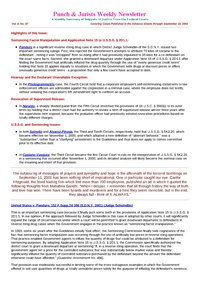The defendant in this case challenged the district court's reliance on the hearsay statements of his co-defendants at sentencing, alleging that: (1) the statements were inherently unreliable in that they were self-serving statements designed to divert blame away from the co-defendants and onto himself; (2) the court erred in …
In this case, the defendant was charged and convicted only of an unstated quantity of drugs. The defendant pled guilty and was sentenced to 69 months - or nine months longer than the five year default provision for marijuana offenses under 21 U.S.C. § 841(b)(1)(D). The panel vacated that …
Here, on remand from the Supreme Court, the Court vacated a sentence imposed in a drug case where the jury was "not even inferentially asked" to determine the quantity of drugs - in the interests of fairness and consistency.
In this case, the defendant's sentence exceeded the statutory …
In this case the defendant contended that he was entitled to notice before sentencing that participation in a mental health program could be imposed as a special condition of supervised release. He maintains that this is required by Rule 32(c)(1) of the Fed.R.Crim.P. and by the Supreme Court's holding …
In this drug case, the majority vacated the defendant's drug sentence based on Apprendi. However, Judge Parker, who concurred specially because he was constrained to do so by Circuit precedent, wrote about his special concerns about certain "troubling aspects of our developing Apprendi jurisprudence." (Id., at 361).
He expressed …
One of the questions raised on this appeal was whether a district court can depart upward from CHC I based on criminal conduct which also constitutes relevant conduct that the district court has already considered in calculating the base level for the offense of conviction. In holding that the …
Here the Court held that prisoners sentenced to incarceration cannot state a viable Thirteenth Amendment claim if the prison system requires them to work since under those conditions "no issue of peonage or involuntary servitude arises".
This case involved a class action prison lawsuit brought by various Muslim inmates against prison officials in which they sought a preliminary injunction forbidding prison officials from disciplining inmates who missed work assignments to attend Friday Aabbeth services. One of the issues raised by the defendants was the authority …
United States v. Spinello, 265 F.3d 150 (3rd Cir. 2001) (Judge Barry)
United States v. Alvarez-Pineda, 258 F.3d 1230 (10th Cir. 2001) (Judge Ebel)
Effective November 1, 2000, the Sentencing Commission amended the Guidelines to add U.S.S.G. § 5K2.20. That Policy Statement was enacted to resolve a Circuit split …
This is one of those absurdly contorted decisions of convenience that shows America’s fixation on doing whatever is necessary to justify long prison sentences - at least for American prisoners. Yet, we submit that if China or Cuba or some banana republic seized one of our citizens and did …
The corporate defendant (herein PDS) and the corporate employee, David Webb (Webb), were convicted of various counts of highway project fraud and mail fraud. The charges stemmed from allegations that PDS and Webb had engaged in a long-term practice of submitting inflated invoices to contractors, who in turn passed …
The defendant in this case was arrested at the Mexican border as he attempted to enter the United States. The pickup truck that he was driving contained packages of marijuana. Defendant's three-year-old son was a passenger in the truck at the time of the border crossing. The district court …
This is an important sentencing case because it finally puts some teeth in the provisions of Application Note 15 to U.S.S.G. § 2D1.1. In our opinion, if the approach followed by Judge Scheindlin in this case is adopted by other courts, it will significantly expand the range of circumstances …
This is the first appellate case we have seen interpreting the provisions of the recently enacted U.S.S.G. § 5K2.20, a Policy Statement that became effective on November 1, 2000. Because of Judge Fuentes' detailed review of the language and history of that provision, this decision will probably become the …
United States v. Spinello, 265 F.3d 150 (3rd Cir. 2001) (Judge Barry)
United States v. Alvarez-Pineda, 258 F.3d 1230 (10th Cir. 2001) (Judge Ebel)
Effective November 1, 2000, the Sentencing Commission amended the Guidelines to add U.S.S.G. § 5K2.20. That Policy Statement was enacted to resolve a Circuit split …
Here the Court held that even though a jury fails to make a specific finding and acquits the defendant of causing the death of another, for purposes of sentencing on other charges, the district court can make that finding on a preponderance of the evidence under the provisions of …
